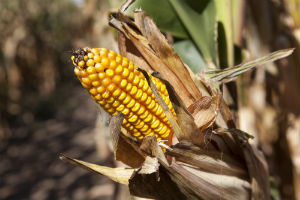High Fructose Corn Syrup Linked to Kidney Stones: 5 Facts to Know

High-fructose corn syrup, or HFCS for short, is a sweetener commonly used in processed foods. It’s included in many foods that one would least suspect, like bread, crackers, pasta sauces, and even pickles. Groups like the Corn Refiner’s Association and companies whose products contain high fructose corn syrup continue to market it as a safe, almost "natural" product. The truth, however, is that studies have shown serious health issues arise from consuming this stuff, including kidney stones.
HFCS and Kidney Stones: What’s the Connection?
Recent research shows that kidney stones are more likely to occur in men, women, and even children who consume HFCS; kidney stones that would otherwise be preventable. Here are 5 facts you need to know to protect yourself and your loved ones against HFCS-induced kidney stone formation.
1. Eating Fructose Increases the Risk of Kidney Stones
Don’t be fooled by industry-fueled marketing campaigns – fructose isn't good stuff and consuming it increases your risk of developing kidney stones. The National Kidney Foundation warns that, "eating too much fructose correlates with increasing the risk of developing a kidney stone." [1] What’s more, a study evaluating data from over 200,000 people determined those who consumed the most refined fructose had a much greater chance of developing kidney stones. [2] Only the refined fructose showed the correlation, with the non-fructose carbohydrates showing no relation to kidney stones.
2. Drinking Soda Makes You Especially Vulnerable
Keeping hydrated is an important part of avoiding kidney stones. But, soda tainted with high fructose corn syrup is a poor choice and drinking it offers virtually no benefit. In fact, a study from Harvard found that people who regularly drank soda had a 33% greater risk of kidney stones; results backed up by other studies as well. [3] [4] Avoiding soda is an easy way to help reduce your risk of developing kidney stones.
3. Fructose Can Metabolize Into Oxalate
Oxalate stones are a type of kidney stones that some individuals are naturally predisposed to developing. Their bodies convert fructose into oxalate at a faster rate. This increases the amount of oxalate in the blood, which can mix with calcium in the kidneys to form stones. I wouldn't call it an allergy to HFCS but it's along those lines.
4. Increases Risk of Uric Acid Stones
Manufactured fructose increases the amount of uric acid excreted in urine; natural fructose from fruit does not. [5] High levels of uric acid, or hyperuricemia, encourage kidney stone formation and gout. Researchers have specifically noted elevated levels of uric acid caused by HFCS have been directly linked to metabolic syndrome, a condition identified by obesity, heart disease, high blood pressure, insulin resistance, and renal failure. [6] [7] Avoid fruit juices and sodas containing HFCS, corn syrup, and other artificial sweeteners to possibly reduce risk.
5. This Garbage Causes Kidney Stones in Kids as Young as 3
As unbelievable as it sounds, it’s completely true. More and more young children, and I mean under the age of 5, are developing kidney stones. Despite the increasing number of children suffering from this condition, researchers only acknowledge the modern diet of highly processed foods as the main contributing factor. [8] However, parents and doctors both report that when HFCS is removed from the diet, the kidney stones go away.
The Fix: Reduce Your HFCS Exposure
Among the best methods for discouraging kidney stones are drinking plenty of water, watching your calcium intake, and reducing your intake of salt, protein, and oxalate-rich foods. These are all worthwhile steps and one additional prudent action would be to eliminate HFCS, corn syrup, and other manufactured chemical additives from your diet. The Corn Refiners Association may not want you to hear it, but the science supports it.
References (8)
- National Kidney Foundation. Kidney Stones. NKF. Fact Sheet.
- Taylor EN1, Curhan GC. Fructose consumption and the risk of kidney stones. Kidney Int. 2008 Jan;73(2):207-12.
- Ferraro PM1, Taylor EN, Gambaro G, Curhan GC. Soda and other beverages and the risk of kidney stones. Clin J Am Soc Nephrol. 2013 Aug;8(8):1389-95. doi: 10.2215/CJN.11661112.
- Rodgers A. Effect of cola consumption on urinary biochemical and physicochemical risk factors associated with calcium oxalate urolithiasis. Urol Res. 1999;27(1):77-81.
- Angelopoulos TJ1, Lowndes J, Zukley L, Melanson KJ, Nguyen V, Huffman A, Rippe JM. The effect of high-fructose corn syrup consumption on triglycerides and uric acid. J Nutr. 2009 Jun;139(6):1242S-1245S. doi: 10.3945/jn.108.098194.
- Cirillo P1, Sato W, Reungjui S, Heinig M, Gersch M, Sautin Y, Nakagawa T, Johnson RJ. Uric acid, the metabolic syndrome, and renal disease. J Am Soc Nephrol. 2006 Dec;17(12 Suppl 3):S165-8.
- Bantle JP. Dietary fructose and metabolic syndrome and diabetes. J Nutr. 2009 Jun;139(6):1263S-1268S. doi: 10.3945/jn.108.098020.
- Tasian GE1, Copelovitch L2. Evaluation and Medical Management of Kidney Stones in Childre. J Urol. 2014 Jun 21. pii: S0022-5347(14)03821-X. doi: 10.1016/j.juro.2014.04.1080.
†Results may vary. Information and statements made are for education purposes and are not intended to replace the advice of your doctor. If you have a severe medical condition or health concern, see your physician.

Dr. Edward Group, DC
FOUNDER | HEALER | ADVOCATEDr. Group, DC is a healer and alternative health advocate, and an industry leader and innovator in the field of natural health who is dedicated to helping others. He is a registered doctor of chiropractic (DC), a naturopathic practitioner (NP), and proud alum of Harvard Business School and MIT Sloan School of Management. Dr. Group, DC is the founder of Global Healing – a mission and vision he has shared through best-selling books and frequent media appearances. He aims to spread his message of positivity, hope, and wellness throughout the world.










